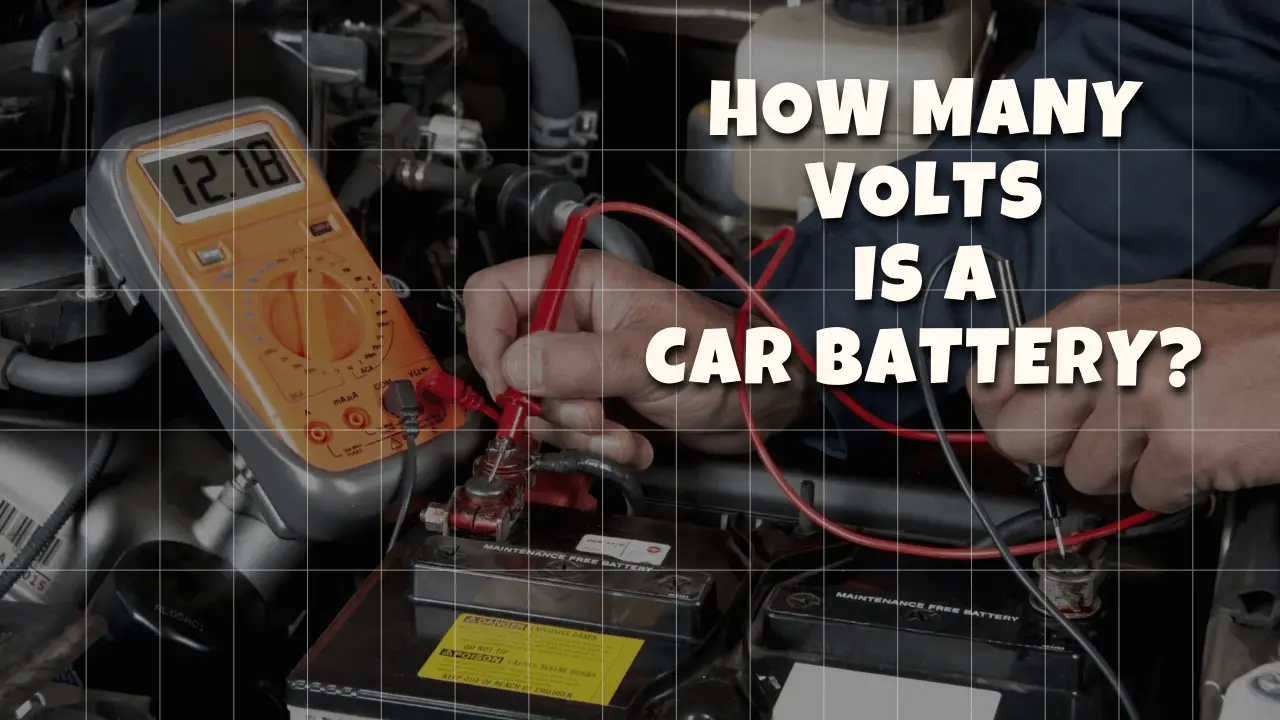Unique Info About How Many Volts Is A Car Battery

Unveiling the Mystery
1. Understanding Car Battery Voltage
So, you're wondering how many volts a car battery packs, huh? It's a fair question, especially if you're dealing with a cranky engine or a flickering dashboard. The answer isn't quite as simple as just shouting "12!" though it's close. In reality, a healthy car battery, the kind that's ready to spring to action on a chilly morning, should clock in at around 12.6 volts when it's sitting pretty and fully charged. Think of it like this: 12.6 volts is its happy place.
Now, before you grab your multimeter and head out to the driveway, understand that this is a static voltage. It's what you'll see when the battery is just chilling, not working hard to start your car or power your radio. When the engine's running, the alternator jumps into the game, charging the battery and typically boosting the voltage to somewhere between 13.7 and 14.7 volts. That range ensures the battery gets a proper charge without getting overcooked, which is definitely something we want to avoid.
Think of your car battery as a reserve tank of electrical energy. It's there to provide the initial jolt to get the engine going and to supplement the alternator when the electrical demand is high — like when you're blasting the AC, have your headlights on full beam, and are simultaneously charging your phone. The voltage tells you how much juice is left in that tank. Lower than 12.6 volts, and you might be looking at a battery that's starting to get weak.
Keep in mind that different types of vehicles, especially those with advanced electrical systems or hybrid components, may have slightly different voltage requirements. It's always a good idea to consult your owner's manual or a trusted mechanic to confirm the correct voltage range for your specific car. Don't just assume all batteries are created equal; your fancy new electric vehicle might have different needs than your grandpa's old pickup truck.

The Voltage Tells a Story
2. Interpreting Voltage Readings
Okay, let's say you've bravely ventured out with your multimeter and taken a reading. What does that number really mean? If you're seeing something close to 12.6 volts or higher with the engine off, congratulations! Your battery is in pretty good shape. You can probably pat yourself on the back and go enjoy a celebratory beverage. But what if the number is lower?
If your reading is hovering around 12.4 volts, your battery is about 75% charged. Still usable, but it might be worth keeping an eye on. A reading of 12.2 volts indicates a 50% charge, which is starting to get a little concerning. At this point, you might experience slow starts or other electrical glitches. Anything below 12 volts is a red flag. Your battery is severely discharged and may be on its last legs. Its time to start thinking about a replacement.
Don't panic if you see a lower voltage. Before you condemn the battery, try charging it. Sometimes a good charge can bring a battery back from the brink, especially if it was simply drained by leaving the lights on or infrequent use. However, if the battery consistently fails to hold a charge, its likely time to bid it farewell and invest in a new one. Think of it as giving your car a new lease on life.
Remember, voltage readings are just one piece of the puzzle. Other factors, like the battery's age, its internal resistance, and the overall condition of your car's electrical system, can also play a role in its performance. If you're unsure about interpreting your readings, it's always best to consult a professional mechanic. They have the tools and expertise to diagnose any potential issues and recommend the best course of action.

When Volts Vanish
3. Addressing Voltage-Related Issues
So, youve confirmed your battery isnt holding its charge, now what? There are several common culprits behind low car battery voltage, and tracking them down can save you from being stranded. One of the most frequent offenders is parasitic drain — thats when something in your car is constantly drawing power, even when the engine is off. Things like faulty lights, aftermarket electronics, or even a poorly closing trunk can slowly drain the battery over time.
Another potential problem is a failing alternator. As mentioned earlier, the alternator is responsible for charging the battery while the engine is running. If the alternator isn't doing its job, the battery will slowly discharge, even during normal driving. A simple test with a multimeter can usually determine if the alternator is functioning correctly. Just check the voltage while the engine is running; it should be within that 13.7 to 14.7 volt range.
Extreme temperatures can also wreak havoc on car batteries. Cold weather slows down the chemical reactions inside the battery, making it harder to start the engine. Hot weather, on the other hand, can accelerate corrosion and shorten the battery's lifespan. Parking in a garage or using a battery blanket in cold climates can help mitigate these effects. Similarly, parking in the shade during hot summer months can help prolong battery life.
Finally, don't underestimate the importance of regular maintenance. Cleaning the battery terminals to remove corrosion can improve electrical conductivity and prevent voltage drops. Also, make sure the battery is securely mounted to prevent vibrations from damaging its internal components. A little preventative care can go a long way in ensuring your car battery stays healthy and reliable for years to come.

Battery
The Lifespan of Volts
4. Maximizing Battery Longevity
Car batteries aren't designed to last forever. In fact, the average car battery typically lasts between three and five years, depending on various factors. Driving habits, climate, and the overall condition of your car's electrical system can all impact battery lifespan. But dont despair; there are things you can do to extend the life of your battery and get the most out of your investment.
One of the simplest things you can do is avoid short trips. Frequent short trips don't give the alternator enough time to fully recharge the battery, which can lead to a gradual discharge. If you primarily use your car for short commutes, consider taking it for a longer drive every now and then to give the battery a good workout. Its like sending your battery to the gym for a little exercise.
Another key factor is reducing electrical load when starting the engine. Turning off unnecessary accessories like headlights, the radio, and the AC can reduce the strain on the battery during startup. This is especially important in cold weather when the battery is already working harder. Give your battery a fighting chance by minimizing the electrical demands placed on it.
Finally, consider investing in a high-quality battery. While cheaper batteries may seem appealing, they often have shorter lifespans and lower performance compared to premium options. A good quality battery is an investment in your car's reliability and can save you money in the long run by avoiding premature replacements. Think of it as buying peace of mind on four wheels.

Volts vs. Amps
5. Distinguishing Voltage and Current
Sometimes, the conversation about car batteries veers into the realm of "volts" versus "amps," and it can get a little confusing. Think of voltage as the pressure of the electrical flow, while amps are the amount of electrical flow. Voltage is what pushes the electricity through the wires, and amps are how much electricity is actually flowing.
Your car battery provides a certain voltage (around 12.6 volts) to power your car's electrical components. But it also needs to deliver enough amperage (amps) to crank the engine. Think of it like water pressure in a hose. Voltage is the pressure, and amps are the amount of water flowing through the hose. You need both pressure and flow to wash your car effectively.
When a car battery is tested, one of the tests often involves measuring the "cold cranking amps" (CCA). This indicates how many amps the battery can deliver at a low temperature (typically 0 degrees Fahrenheit) for 30 seconds while maintaining a voltage above a certain level. A higher CCA rating generally indicates a more powerful battery, especially important for starting in cold weather.
So, while voltage is a good indicator of battery health, amps are crucial for starting the engine. A battery might have the correct voltage, but if it can't deliver enough amps, your car won't start. Thats why its important to consider both voltage and CCA when choosing a car battery. Its the dynamic duo of car battery performance.

Frequently Asked Questions (FAQs) About Car Battery Voltage
6. Your Car Battery Questions Answered
Here are some common questions people have about car battery voltage:
Q: What happens if my car battery voltage is too low?
A: If your car battery voltage is too low (below 12 volts), your car may have trouble starting, or it may not start at all. You might also experience dimming headlights, a weak horn, or other electrical issues.
Q: Can I jump-start a car with a low voltage battery?
A: Yes, you can usually jump-start a car with a low voltage battery, but it's essential to diagnose the underlying problem that caused the low voltage. If the battery is old or damaged, it may need to be replaced.
Q: How do I check my car battery voltage?
A: You can check your car battery voltage using a multimeter. Connect the red lead to the positive terminal and the black lead to the negative terminal. The multimeter will display the battery's voltage.
Q: Is it safe to drive with a low car battery voltage?
A: It's not recommended to drive with a significantly low car battery voltage. The car may stall, and the electrical components may not function correctly. It's best to address the issue as soon as possible to avoid getting stranded.